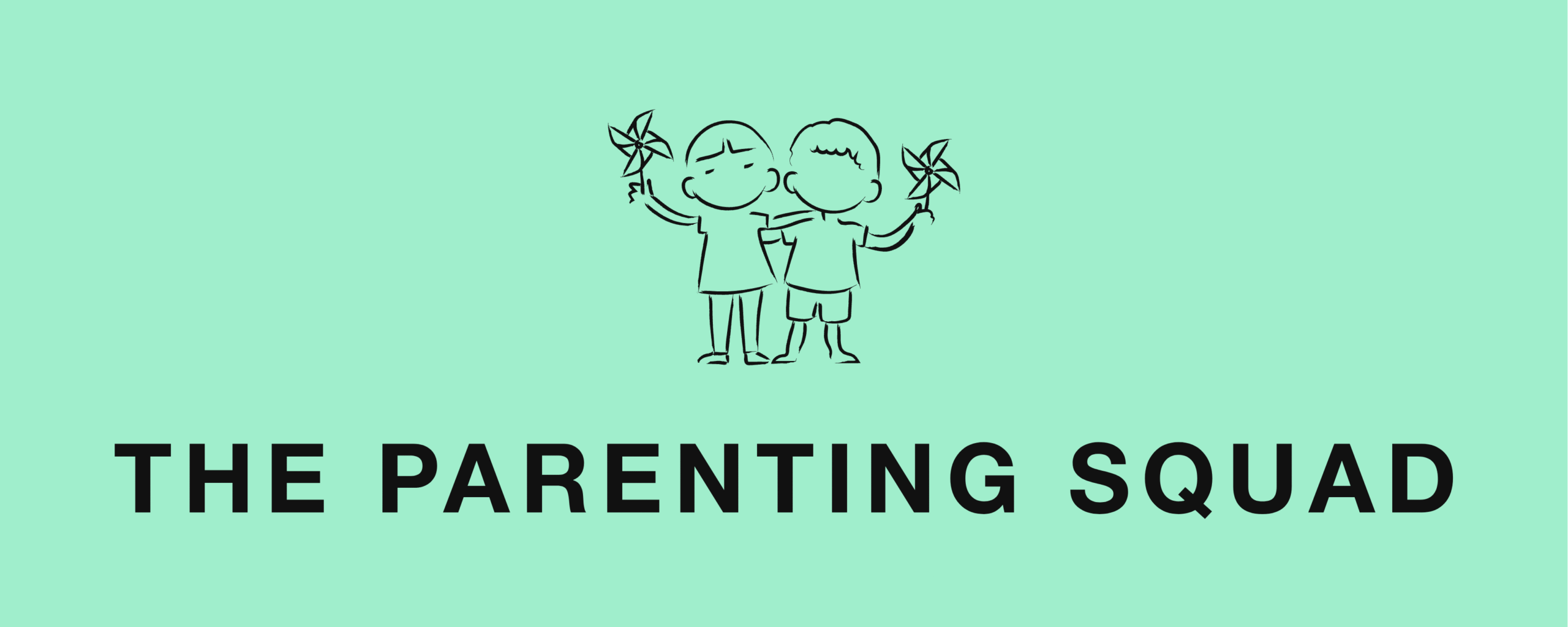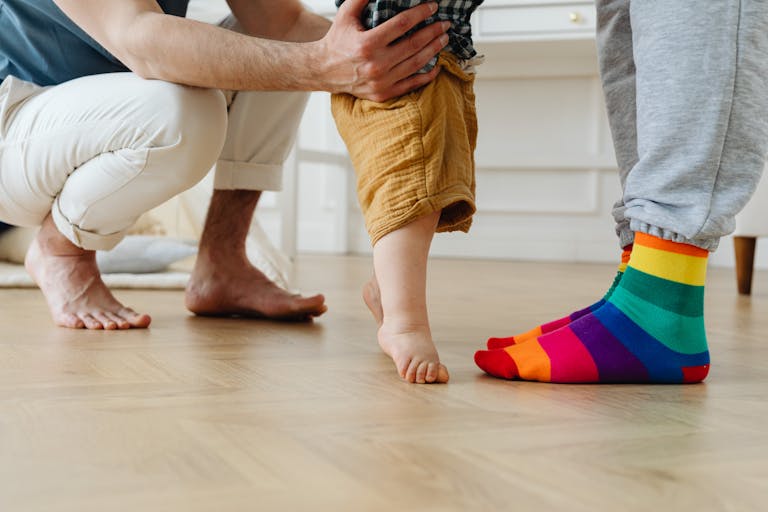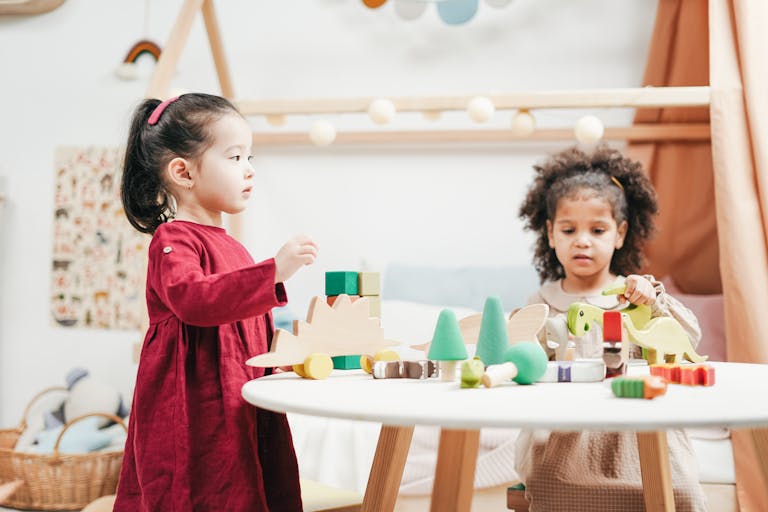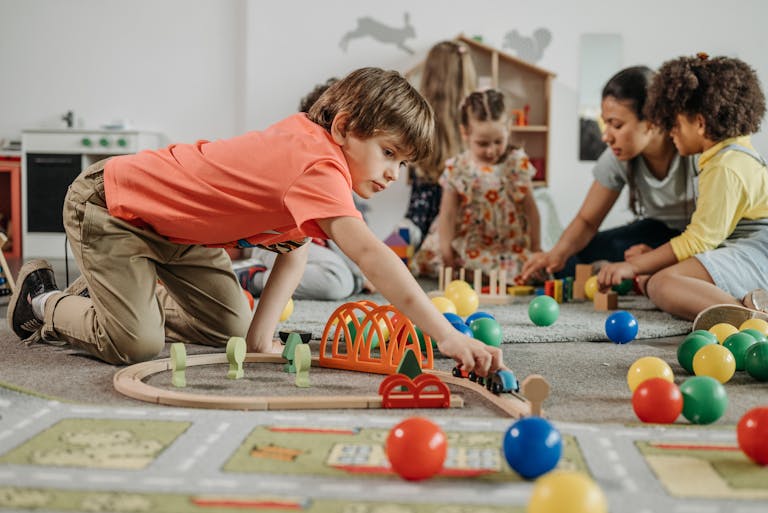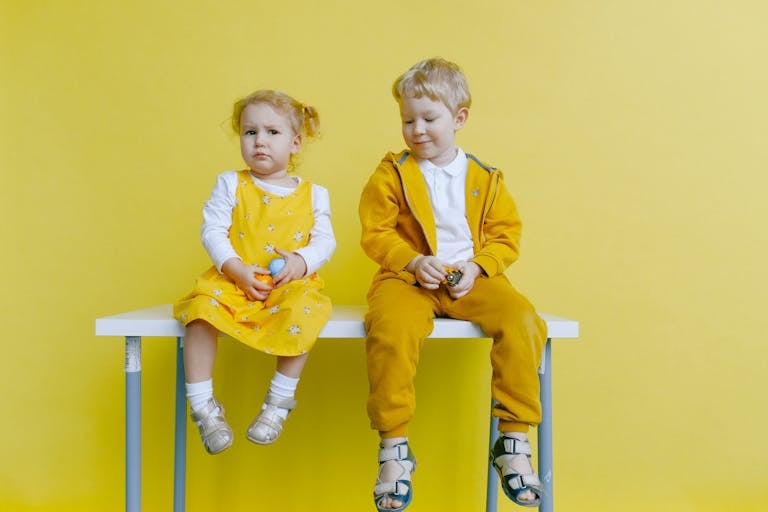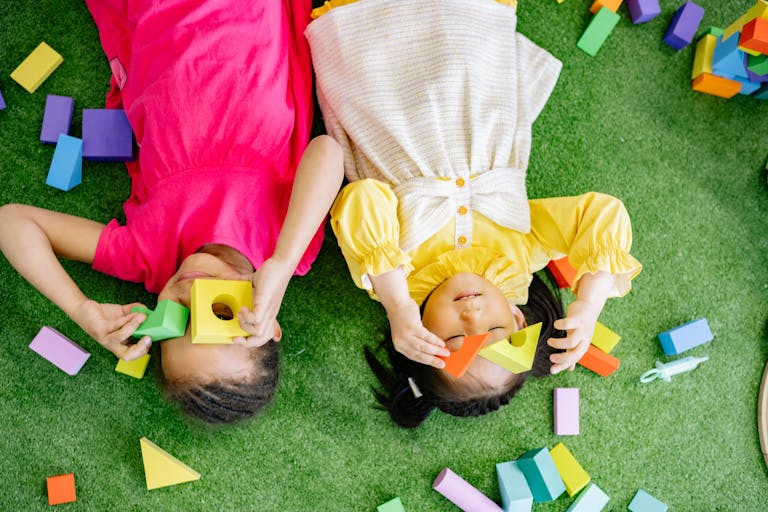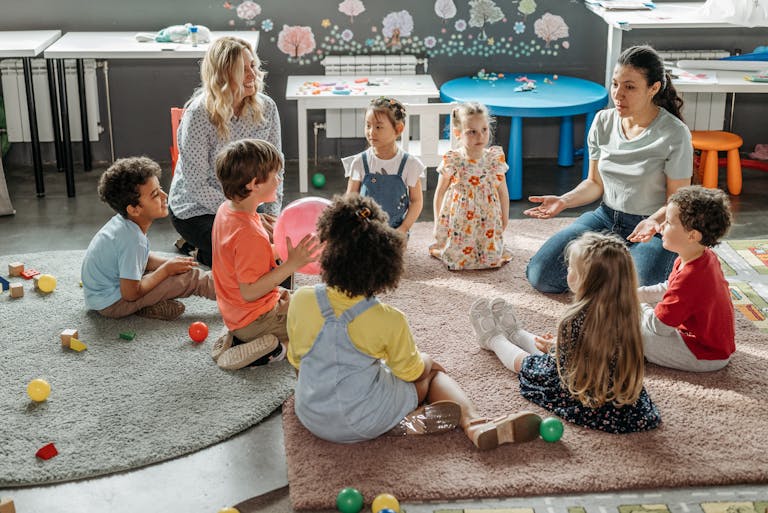How Social Interactions Shape Childhood Brain Development
You’re watching your 4-year-old navigate their first real friendship drama. One minute, they’re best buddies sharing goldfish crackers, the next minute, there’s a full-blown argument over who gets the red crayon.
As a parent, you might wonder if you should intervene or let them figure it out. Here’s what might surprise you: that seemingly chaotic social moment is actually rewiring their brain in real time.
Research shows that social experiences don’t just influence our children’s personalities – they literally reshape their neural pathways. Every playground negotiation, family dinner conversation, and yes, even those dramatic friendship moments, are building crucial brain connections that will serve your child for life.
Let’s explore why those seemingly simple interactions are actually brain-building powerhouses and share practical ways to nurture healthy social skills at every age.
The Brain Building Magic of Social Interaction
Think of your child’s brain as a construction site and social interactions as the master builders working around the clock. When children interact with others, multiple brain regions light up simultaneously like a well-orchestrated symphony.
The areas responsible for language, emotional processing, problem solving, and memory all work together, creating stronger and more complex neural networks. Social interactions help the brain form new connections and build more complex circuits, which are essential for shaping the brain’s architecture and supporting healthy brain development.
Scientists have discovered what they call the “social brain” – a network of brain regions that develops specifically through interpersonal experiences. This social brain development is fundamentally different from individual learning because it requires children to process multiple perspectives, read emotional cues, and adapt their responses in real time.
Here’s where it gets really interesting: neuroimaging studies show that children’s brains physically change through social engagement. The more meaningful social experiences a child has, the more robust their neural connections become in areas related to empathy, communication, and emotional regulation.
Why Peer Play is Actually Brain Training in Disguise
That hour your kid spent at the playground arguing over swing turns? That wasn’t just play – that was executive function training. When children navigate peer relationships, they’re developing skills like impulse control, working memory, and cognitive flexibility.
Let’s break down what’s really happening during those “boring” playground activities. When your child waits their turn on the slide, their brain is practicing impulse control and delay of gratification. When they negotiate who gets to be the teacher in pretend school, they’re developing planning abilities and perspective-taking skills. Even resolving conflicts over who knocked down whose block tower is building problem-solving neural pathways.
It can be tempting to jump in when parents see their kids struggling with social challenges. They want to smooth over every conflict and protect themselves from disappointment. But here’s what child development experts want us to know: those moments of social friction are actually where the real learning happens.
Think about it this way – if we always rescued our children from social challenges, it would be like doing their push-ups for them at the gym. They need those opportunities to flex their social muscles and build resilience. Peer play is essential for the developing brain, supporting the growth of self-control and self-regulation skills that are foundational for emotional and behavioral success.
Of course, we don’t let them figure everything out alone. The key is knowing when to step in with guidance versus when to let them work through it independently.
Family Bonds: The First Social School for Your Child’s Brain
Before your child ever sets foot on a playground, their social brain development begins at home. Family interactions create the foundational neural pathways that will influence how they relate to others for the rest of their lives.
Every family conversation – from discussing weekend plans to working through sibling disagreements – is building your child’s language processing and emotional regulation skills. When you listen to your child’s stories about their day, you’re teaching them that their thoughts and feelings matter. When you help them work through big emotions, you’re literally helping their brain develop healthy coping mechanisms.
Attachment theory tells us that secure family bonds create a “safe base” from which children can explore social relationships with confidence. Children who feel securely connected to their families develop stronger neural pathways related to trust, emotional regulation, and social competence.
The good news is that healthy social development happens in all kinds of family structures – single-parent homes, blended families, multi-generational households, and families with same sex parents all contribute to robust social brain development. What matters most isn’t the family structure but the quality of emotional connection and communication.
Supportive family members and community members act as positive influences, shaping a child’s experiences and playing a crucial role in their overall well-being.
Early Friendships: More Than Just Fun and Games
While family relationships provide the foundation, peer friendships offer something uniquely valuable for brain development. Unlike adult-child relationships, friendships between children are more reciprocal and equal, teaching different social skills.
Early friendships and early experiences are essentially empathy boot camps. When your child plays with a friend, they’re constantly practicing perspective taking – figuring out what their friend is thinking, feeling, and wanting. This back-and-forth dance of social interaction builds neural pathways related to empathy and emotional intelligence.
Friendship drama can be stressful for parents. We watch our children navigate hurt feelings, exclusion, and disappointment, and our hearts break a little. But here’s some reassurance: learning to handle friendship challenges is actually a crucial part of healthy brain development.
Age-appropriate expectations can help ease our worries. Preschoolers typically engage in parallel play and are just learning to share. Elementary-age children begin forming closer friendships but may still struggle with loyalty and inclusion. By middle school, friendships become more complex and emotionally intense as children develop stronger empathy skills.
The key is knowing when to step in versus when to let kids navigate independently. Offer guidance when they ask for help, teach problem-solving strategies, but resist the urge to fix every social situation. Remember, working through friendship challenges builds resilience and social competence.
Red Flags and Green Lights: Reading Your Child’s Social Brain Growth and Development
Understanding social milestones can help parents recognize typical development, ease anxiety, and determine when additional support may be helpful. Every child develops at their own pace with a broad range of “normal” behaviors. Below are key social milestones by age, signs of healthy development, and areas to watch for potential concerns:
- Toddlers and Preschoolers
Start showing interest in other children, engaging in simple back-and-forth games, and practicing early years of sharing skills (though sharing often takes time to master).
- School-Age Children
Form friendships, show empathy when others are upset, and participate in cooperative play with established rules.
- Signs of Healthy Social Development
Include interest in others, age-appropriate empathy, ability to engage in reciprocal play, and ability to handle social disappointment reasonably well. Introversion is normal, too – social development doesn’t mean being the most outgoing.
- Potential Areas of Concern
Persistent trouble connecting with peers, extreme aggression or withdrawal, or difficulty reading basic social cues by school age. These patterns may indicate the need for early intervention.
- For Neurodivergent Children
Social development may look different, but it is equally important. Some children may require explicit teaching of social skills, which is perfectly okay. Every child deserves tailored support for their unique needs.
Practical Ways to Nurture Your Child’s Social Brain
Helping children build social skills doesn’t require elaborate plans or costly activities. Every day moments provide plenty of opportunities for meaningful interactions that help kids grow socially and emotionally. Here’s how you can create these opportunities and support your child’s social development:
- Age Appropriate Activities: Take your child to playgrounds, library story times, or on neighborhood walks where they can meet and interact with others. Simple activities can foster connection and practice important social skills.
- Start Small for Shy Children: Begin with one-on-one playdates in familiar settings to build confidence before introducing larger group interactions.
- Gentle Coaching: Offer guidance without micromanaging. For example, say, “I noticed your friend looked upset. What do you think might help?” This encourages problem-solving without taking over.
- Post Interaction Reflection: After social activities, ask open-ended questions like, “What was the best part of playing with your friend?” to help your child process their experiences and learn from them.
- Family as a Role Model: Build social confidence at home through family game nights, teamwork-based projects, and modeling healthy relationships. Children learn a lot by watching how you interact with others.
Communities play a big role in supporting healthy brain growth by promoting proper nutrition, health, and access to early education opportunities for children.
Your Child’s Social Brain is Always Growing
Here’s the most important takeaway: every single social interaction is making a difference in your child’s brain development. Those everyday moments – helping a sibling, chatting with a neighbor, working through a playground disagreement – are all contributing to robust neural development. You don’t have to be perfect or create big social opportunities. Small, real interactions have the biggest impact. Trust your gut and stay curious about childhood brain development.
Take a moment to notice your child’s social growth. See how they’ve changed in their ability to share, empathize, or resolve conflicts. Every child develops at their own pace, and celebrating small wins helps build their confidence.
From birth to early adulthood, the brain is growing rapidly, and a baby’s brain is forming and strengthening connections over a long period of time. Early brain development and brain architecture are shaped by both positive and negative influences, including chronic stress and toxic stress, which can disrupt how connections are formed and refined through a process called pruning.
Your child’s social brain will continue to grow and adapt throughout their life. The foundation you’re building now – through family and peer relationships – is setting them up for a lifetime of meaningful relationships and emotional resilience. And honestly? That’s pretty cool!
